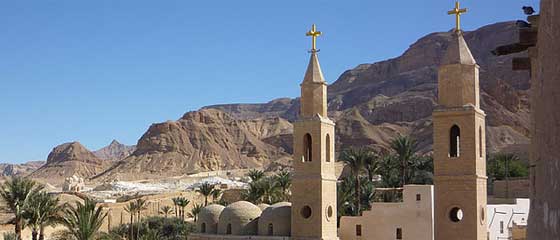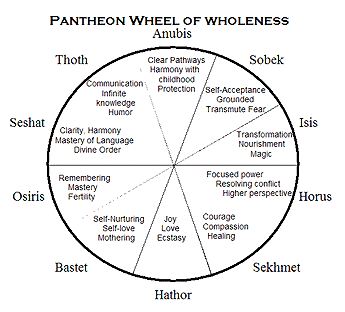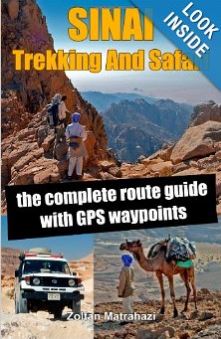
Spiritual Egypt
An introduction to Spiritual Tourism in Egypt including biblical tourism, halal tourism, meditation, yoga, metaphysical and pantheistic holidays
‘Spiritual Tourism’ is a term variously used to describe tours to Egypt (either organised or independent) that place focus on spiritual development.
Indeed the Online Free Dictionary describes the practice as either:
1. A journey to a sacred place or shrine.
2. A long journey or search, especially one of exalted purpose or moral
significance.
Egypt has long attracted travellers on spiritual quests and it continues to do so today.
Asceticism was born here, when early saints like Anthony and Paul sequestered themselves in the desert to meditate and connect with their God.
The country is littered with ancient monasteries, churches, biblical site and mosques and members of all faiths come together to celebrate religious festivals and moulids (birthdays of holy people).
Increasingly however, the term ‘spiritual’ is used to describe ‘alternative’ spiritual or religious tourism to Egypt such as tours that focus on meditation, metaphysics, astrology or ancient belief.
The following, non exhaustive list, is discussed here:
- Biblical Pilgrimages
- Meditation
- Metaphysics
- Ancient Belief
- Yoga
- Halal Tourism
Biblical Tourism in Egypt
Many of the stories of the Old and New Testament are set against a Middle Eastern backdrop that includes modern day Syria, Jordan, Israel, Palestine and Egypt. Egypt therefore contains a number of sites that are of sacred significance to Christian, Jews and Muslims (who also believe in these scriptures).
Most famously, thousands flock to Egypt each year to make the pilgrimage to the summit of Mount Sinai, the ancient peak upon which Moses is believed to have received the Ten Commandments. At its base, St Catherine’s Monastery – one of the oldest and most revered orthodox institutions on the planet – draws pilgrims and tourists to its fortified walls which contain an alleged descendent of the very Burning Bush through which God spoke to Moses.
If Christianity was born in Israel, it spent much of its infancy in Egypt as early practitioners fled to the mountains around Sinai and the Red Sea Coast to escape persecution. Later, Egypt saw the birth of asceticism, the practice of abstinence and isolation in pursuit of higher spiritual goals
Many come to visit the early monuments to ascetic pioneers such as the Monasteries of St Paul and St Anthony, two of the oldest Christian monasteries on the planet. The Copts – Egypt’s Christina population – are one of the oldest sects of Christianity in the world and have over last 1900 years built an abundance of monasteries, churches, temples, schools and other structures across the country.
Read more about Christian Egypt
Meditation
According to the free online dictionary, Meditation is the ‘practice of concentrated focus…in order to increase awareness of the present moment, reduce stress, promote relaxation, and enhance personal and spiritual growth.’
If you were to scour you’re favourite search engine for the words ‘meditation tours to Egypt’, you would find an ever increasing selection of suitable tour operators based both in Egypt and elsewhere.
Classic itineraries are combined with structured meditation sessions lead by an experienced tour leader and culminating in an altogether richer Egyptian experience.
In any meditation session, concentration is the key challenge and the distractions at home may be many. The idea of attempting the same practice in an area of all encompassing stillness like the desert is greatly appealing.
Alternatively a private session in an ancient temple where spirituality has been taught and practiced for eons can be similarly conducive to a peaceful and enlightened mind.
Tour operators approach their meditation itineraries from varying schools of thought from the religious to the secular, from the practical to the all out whacky.
Metaphysical
For some spiritual tour operators, Egypt offers much more than simply conducive locations in which to practice.
In 1921, Alfred Watkins proposed the existence of ‘Ley’ lines as hypothetical alignments that connect ancient monuments across the globe and with which the ancient civilisations were able to navigate across continents.
These ‘rivers of energy’ are claimed by some to exist in Egypt and can be further fortified by certain celestial events or the geometry of the structures that sit upon them (i.e. a pyramid shape).
Some of the more ‘alternative’ operators actively seek out these locations, power structures and events for group meditation and prayer.
Ancient Religion
While all but dead in Egypt, the Pantheistic religion of the pharaohs is still practiced by some foreign groups. Like the Greeks and the Romans, the ancient Egyptians believed in a number of deities and attributed each with specific emotions and attributes.
Practitioners are encouraged to use prayer and meditation to explore the deities who are related to the specific skill or emotion on which they wish to build.

Yoga
As Yoga has enjoyed increasing popularity in West in recent years (with ½ million regular practitioners in England alone according to the Independent), so too has the concept of combining travel and advanced Yogic practice.
And it’s easy to understand why. Yoga has been shown to have profound positive effects on individuals mental and physical well being.
It’s also fun and a great way to meet other like minded individuals.
A multitude of tour operators exist offering varying approaches to Yoga at destinations across Egypt for practitioners at all levels. In 2007, Sharm El Sheikh hosted Egypt’s first Yoga Festival, an event that’s still going strong in 2012.
Many travellers also choose to combine Yoga adventures with other activities such as trekking or diving.
Halal Tourism
With the election a Muslim Brotherhood candidate to power in 2012, Halal Tourism (also known as Sharia Tourism) is a niche which looks set to gain increasing popularity in Egypt.
Literally meaning ‘permissible’, Halal is a term usually reserved for meat that has been prepared according to the practices of Islam.
Similarly, when applied to tourism, Halal Tourism can be described as travel experiences that adhere to those same principles.
For example, Halal Packages are alcohol-free, they incorporate prayer times into their itineraries and even have separate spa, pool and beach facilities for men and women with strict dress codes.
Although unlikely to replace modern beach tourism in Egypt overnight, we can expect the ever increasing number of tourists from wealthy Gulf States to mean that more tourism companies and professionals target this relatively new market.
Not just in Egypt but the world over.
For More Information:
The Free Online Dictionary for Word and Concepts
Pantheon Wheel of Wholeness taken from Egypt is Calling
The Independent Newspaper - The Popularity of Yoga
Wikipedia - For more about Ley Lines and Alfred Watkins




